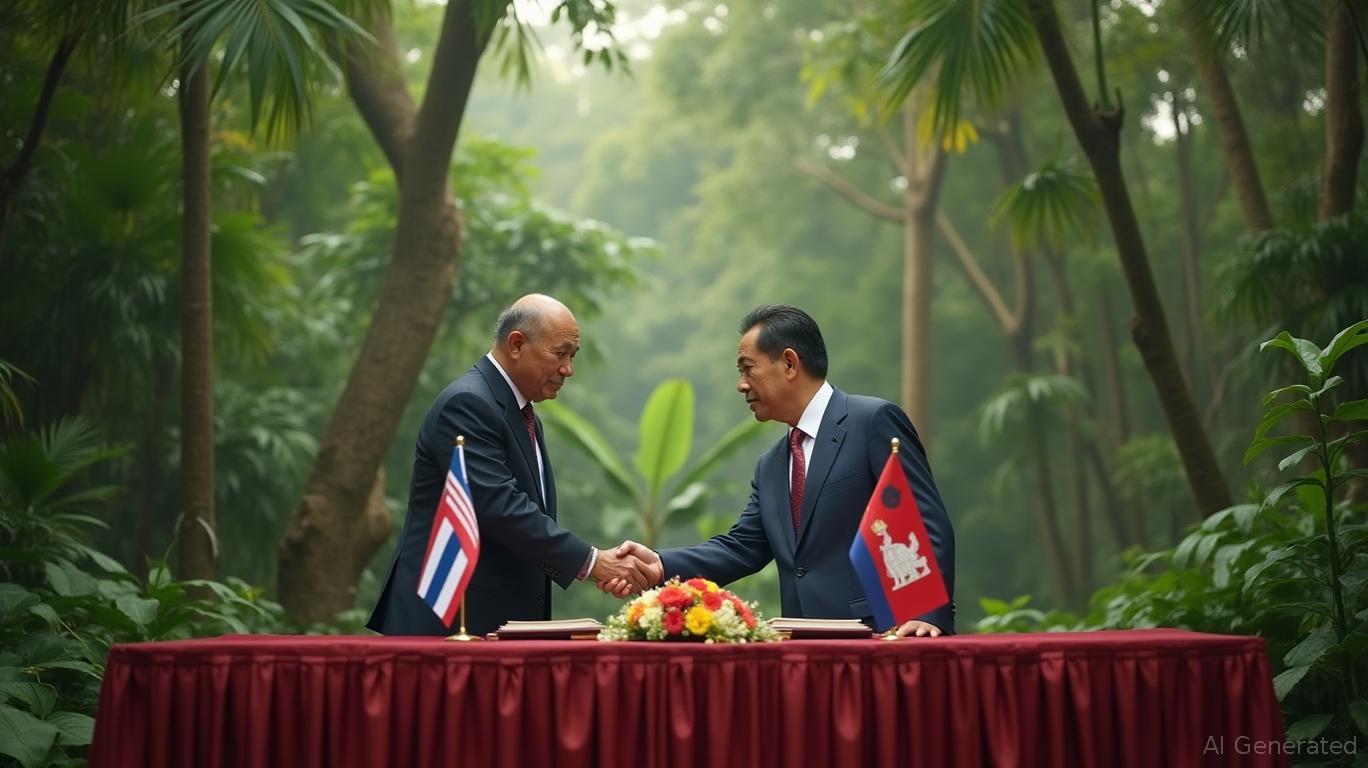U.S.-Supported Thailand-Cambodia Accord: A Strategic Geopolitical Maneuver for Stability in Southeast Asia
- Thailand and Cambodia near historic peace deal, backed by U.S., to end border clashes with weapon withdrawals and joint de-mining. - U.S. involvement highlights regional influence amid China’s growing presence, with Trump set to witness the October 25 signing. - Thailand unveils $150M tourism stimulus to boost domestic travel, balancing fiscal prudence with growth targets. - China-U.S. trade talks in Malaysia aim to ease tensions over tariffs, with both sides addressing trade barriers and rare-earth expo
Thailand and Cambodia are close to reaching a landmark peace deal aimed at ending months of violent border disputes, with U.S. President Donald Trump expected to attend the signing ceremony during the ASEAN summit in Kuala Lumpur. Thai Defense Minister Natthaphon Narkphanit noted that the negotiations have made "substantial headway," as both countries have agreed to pull back heavy weaponry from contested areas, begin collaborative landmine clearance, and form a joint task force to combat cybercrime. The agreement, anticipated to be formalized on October 25, represents a major advance for stability in Southeast Asia, a region long challenged by territorial conflicts and political friction, according to
This accord unfolds against a backdrop of shifting geopolitics, with the U.S. aiming to bolster its regional role as China’s influence expands. American mediation in the July ceasefire and the participation of U.S. observers in ongoing discussions highlight the deal’s strategic weight. Cambodia’s Deputy Prime Minister Tea Seiha stressed the importance of "reciprocal trust and assurance" throughout the talks, which also involve the release of 18 Cambodian soldiers held in detention,

Separately, Thailand’s tourism industry is poised to benefit from a 150 million dollar stimulus initiative designed to encourage local travel and aid economic revival. The government has introduced tax breaks for both individuals and companies, with special incentives for visiting less-traveled provinces and organizing business events. Finance Permanent Secretary Lavaron Sangsnit explained that these policies are intended to spur spending before the peak tourism season, potentially boosting GDP growth by 0.04%. However, the plan is expected to reduce tax income by about 5 billion baht, illustrating the challenge of balancing fiscal responsibility with economic support, as reported by
At the same time, American and Chinese representatives are preparing for trade discussions in Malaysia, aiming to ease tensions heightened by Trump’s recent tariff threats on Chinese imports. The Chinese delegation, led by Vice Premier He Lifeng, will address topics such as rare-earth exports and trade restrictions,
The intersection of these events underscores the shifting economic and political environment in Southeast Asia. Thailand’s internal reforms and diplomatic initiatives are in step with broader U.S. and Chinese efforts to influence trade and security in the region. As ASEAN leaders convene in Kuala Lumpur, the outcomes of the Thailand-Cambodia peace agreement and the China-U.S. trade talks may set important examples for future regional cooperation amid intensifying strategic rivalry.
Disclaimer: The content of this article solely reflects the author's opinion and does not represent the platform in any capacity. This article is not intended to serve as a reference for making investment decisions.
You may also like
Bitcoin News Update: Prenetics Secures $48M Funding, Igniting Discussion on Medical Advancements and Bitcoin Market Fluctuations
- Prenetics raised $48M via equity offering to expand its IM8 supplement brand and Bitcoin treasury strategy, priced at $16.08 per unit. - The deal includes 2.99M shares and warrants with 50-100% premiums, aiming to fund IM8's $100M ARR growth and daily BTC purchases. - Market reaction was mixed, with shares down 15% premarket amid concerns over shareholder dilution and Bitcoin price volatility risks. - The offering, underwritten by Trump-backed Dominari Securities, highlights Prenetics' "health-and-wealth

Bitcoin News Update: BlockDAG Emerges as Ethereum’s Successor: $430M Presale Addresses Scalability’s $430M Challenge
- BlockDAG (BDAG) leads 2025 crypto with $430M presale, 27B tokens sold, and 4,500 dApp developers, leveraging hybrid DAG-PoW architecture to achieve 1,400 TPS. - Chainlink integrates S&P risk assessments for 2,400+ institutions while Render (RNDR) expands AI compute with H200 GPUs, projecting $6–$7 price targets by year-end. - Snorter Token (SNORT) and Bitcoin Hyper face speculation amid $5.7M and $13M presales, contrasting BlockDAG's utility-driven model with 20,000+ miners and 3.5M X1 app users. - Block

Canada Sets November Stablecoin Regulations to Prevent Capital Outflow and Safeguard National Sovereignty
- Canada’s November 4 budget will formalize stablecoin regulations as payment instruments, aligning with U.S. standards to curb capital flight to dollar-backed tokens. - Industry leaders warn delayed regulation risks Canadian bond demand, higher interest rates, and loss of monetary policy control due to U.S. stablecoin dominance. - Proposed rules include licensing, reserve requirements, and redemption terms to mitigate systemic risks, while Loon’s CAD-backed stablecoin aims to build domestic digital infras

Solana Updates Today: Blockchain Meets AI to Transform Financial Models
- Reliance Global Group adds Solana (SOL) to its digital asset treasury, expanding blockchain investments alongside Bitcoin and Ethereum. - Solana's 65,000 TPS hybrid architecture and instant finality position it as a scalable solution for enterprise blockchain adoption. - Kite AI integrates Coinbase's X402 standard for autonomous AI agent payments, enabling machine-to-machine transactions with enhanced security. - $33M funding led by PayPal Ventures accelerates Kite AI's development of AI-driven payment i
